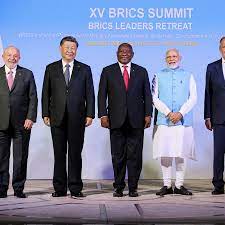Could Europe stand to gain from the expansion of BRICS?

Brussels: Our continent does not have a choice but to seize this opportunity to unlock the potential behind the bloc’s enlargement, if it wants to continue playing a leading role in shaping the new global governance, Oliver Rolofs writes.
The recent enlargement of the BRICS alliance has sent shockwaves through global politics.
With Argentina, Ethiopia, Egypt, Iran, Saudi Arabia, and the United Arab Emirates joining the ranks, questions arise about the implications for Europe and the West.
Is this a threat to Western leadership, or an opportunity for stability on the world stage?
At the heart of this transformation lies the inclusion of the Arabian Gulf’s heavyweights, Saudi Arabia and the UAE, both longstanding Western allies.
Yet, Europe must look beyond surface interpretations to recognise the latent potential of this development.
Ask any Gulf analyst, and they will tell you: this isn’t just a diplomatic move, it’s a strategic commitment by the two Gulf countries to safeguard their interests and ensure long-term stability, energy security, and prosperity. Europe should take note of the broader implications.
Firstly, the region has emerged as a global hub for high-profile events and conferences, from the upcoming UN Climate Change Conference COP28 in Dubai to peace negotiations in Doha during the Afghan crisis.
Their addition diversifies BRICS, promoting a more balanced world order and diluting what some might perceive as the anti-Western sentiment of BRICS, which is driven largely by Putin’s Russia and Xi’s China.
COP28 UAE President-Designate, Sultan Ahmed al-Jaber, attends a joint press conference on the second day of the Petersberg Climate Dialogue in Berlin, May 2023John MacDougall/Pool Photo via AP
It serves as a crucial crossroads for nations to collaborate and build alliances, with the UAE acting as a global convener between diverse regions.
Secondly, the inclusion of Saudi Arabia and the UAE in BRICS offers numerous advantages, given the substantial political influence in the global economy that these giants wield.
Their addition diversifies BRICS, promoting a more balanced world order and diluting what some might perceive as the anti-Western sentiment of BRICS, which is driven largely by Putin’s Russia and Xi’s China.
The UAE and Saudi Arabia, acting as conduits between Asia, Africa, and the BRICS nations, offer Europe numerous opportunities.
Engaging with these Gulf countries can influence the direction BRICS will take in the future, diversifying global alliances beyond traditional Western partners.
This dynamic relationship could play a pivotal role within the EU, shaping Europe-Gulf relations, in part, within the BRICS framework while safeguarding European interests and values.
In that regard, Europe, especially Germany, stands to gain from this partnership, enhancing energy security given the Gulf’s significance in the global energy market.
Germany’s dedication to sustainability aligns with the UAE’s clean technology and renewable energy expertise, promoting global climate protection.
Take the UAE, for instance, known for its economic diversification efforts. While once heavily reliant on oil, it has diversified into tourism, technology, and renewable energy.
Hosting the International Renewable Energy Agency (IRENA) underscores its commitment to green technologies.
Similarly, the Gulf region’s vast deserts are ideal for solar projects like Desertec, and its strategic access to waterways facilitates wind energy and sustainable urbanisation, such as Masdar City.
Germany’s dedication to sustainability aligns with the UAE’s clean technology and renewable energy expertise, promoting global climate protection.
For Germany and Europe, this development presents both opportunities and challenges.
Germany, as a European economic powerhouse, could tap into new markets in the emerging BRICS and Middle East countries, bolstering economic growth, employment, and global influence.
Strong economic ties already exist between Germany and the UAE in sectors like mechanical engineering, automotive, renewable energy, and chemicals.
The challenge lies in striking a balance that promotes European interests while fostering stability and cooperation amidst this evolving geopolitical landscape.
The UAE’s BRICS membership opens doors for German companies in these pivotal markets.





